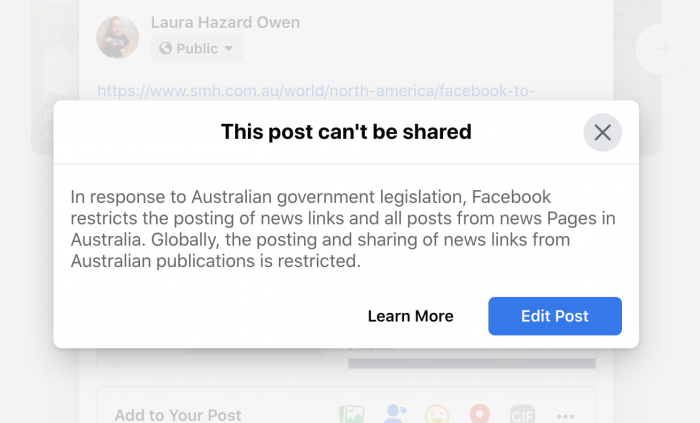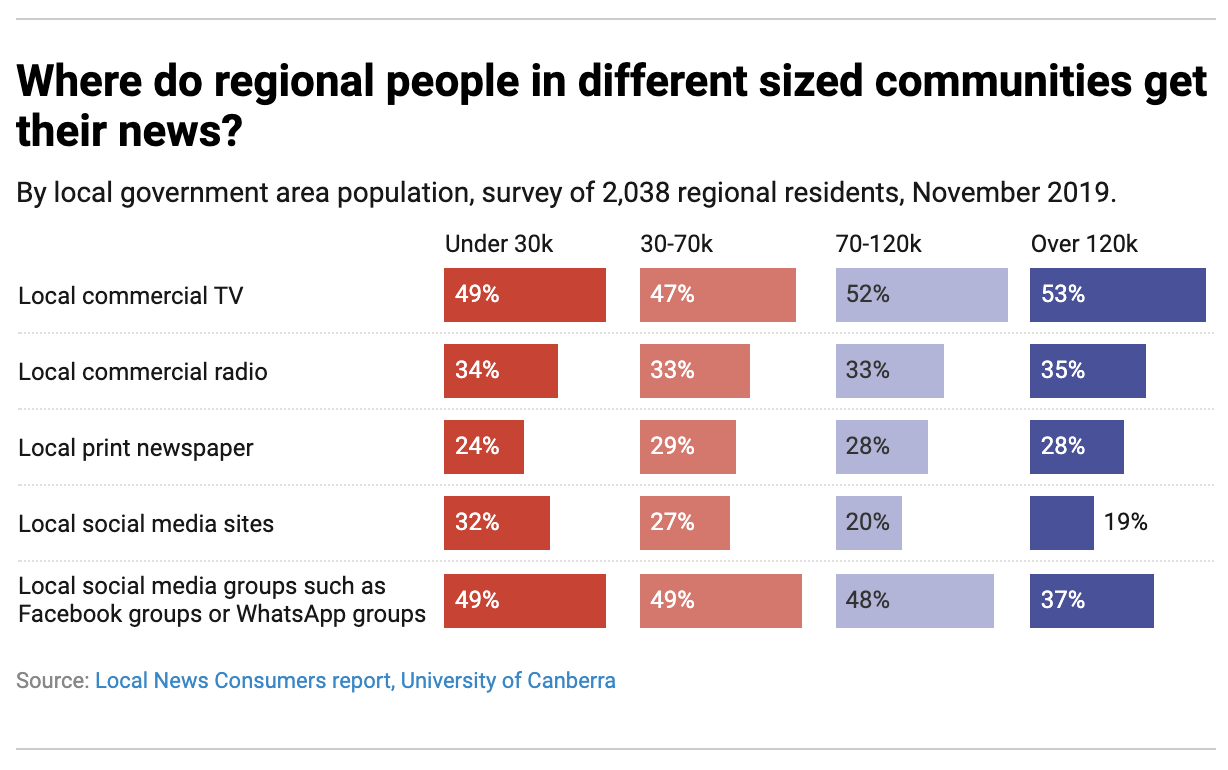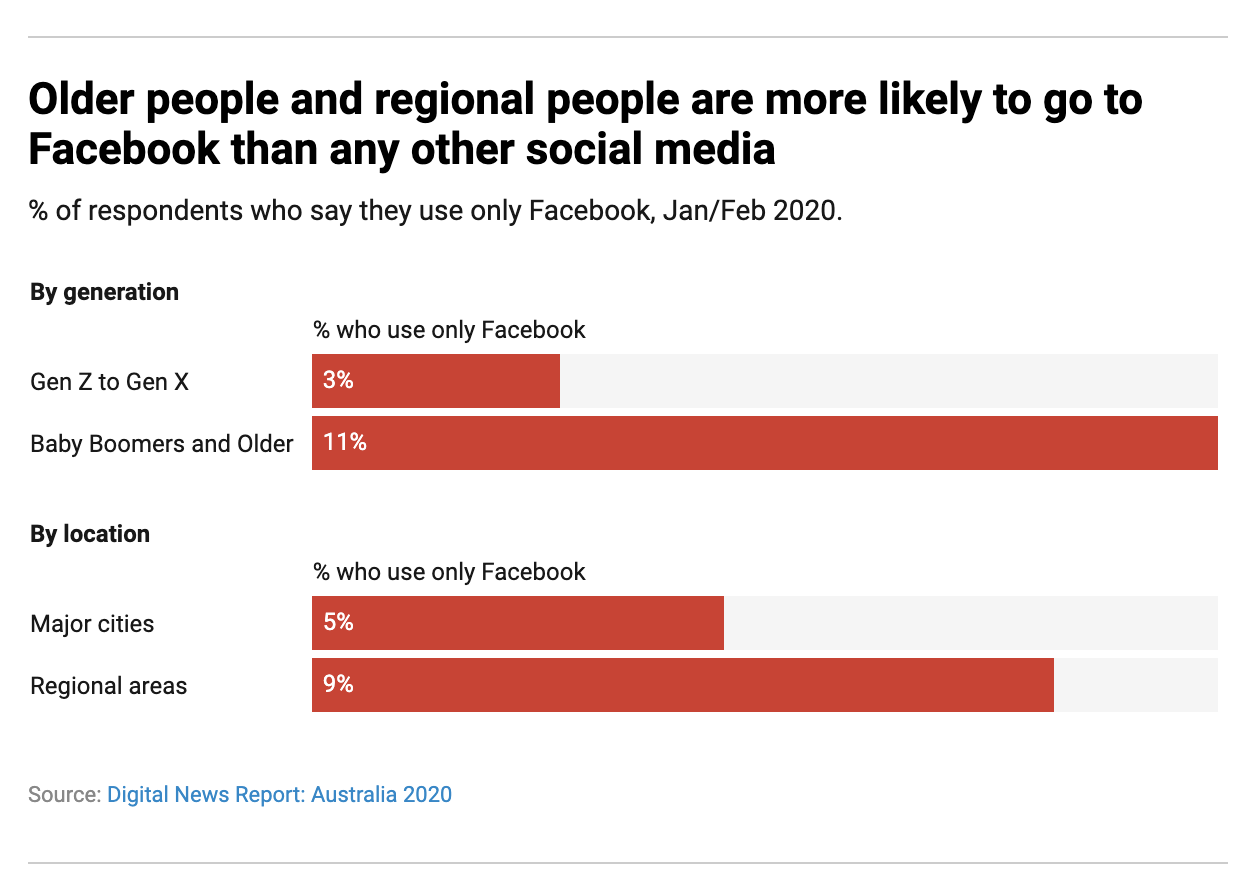
Facebook’s decision to remove Australian news from its platform is the latest gambit in a running stoush with the federal government over its proposed news media bargaining law.
For months, the tech giant has been threatening to restrict Australian news on its service. On the eve of the legislation being passed, it made good on its threat.Our research indicates Facebook’s blocking decision is likely to hurt rural, elderly news consumers the most.
A study of local news consumption by the News and Media Research Center at the University of Canberra shows 32% of people in regions with populations under 30,000 have been turning to social media to fill the news gap.
Newspaper closures and job losses have hit areas outside Australian cities hard. More than 100 local news outlets have closed during the Covid-19 pandemic. Removing news from Facebook will further restrict the choices of people with already limited access to news.

More than a quarter (27%) of those who experienced news closures in their local area use social media to get local news, compared to only 16% of those who did not experience a closure.
While younger generations use social media more than older generations, they get news from several social media platforms. For older people, Facebook tends to be the only social media they use for news. Therefore, they are more likely to be affected by this block.

While certain marginalized groups will be impacted more than others, it is important to remember that for most Australians in a hybrid media environment, Facebook is just one source of news.
The Digital News Report: Australia 2020 shows three-quarters of news consumers in the country get their news from two or more different online and offline sources.
While Facebook is by far the most popular social media platform for news in Australia (39%), almost all consumers use more than one platform to get their news. Only 6% of Australians use Facebook to access news to the exclusion of all other social media platforms.
Further, the use of Facebook for news is plateauing globally. In Australia, it has fallen from 45% in 2016 to 39% in 2020.
While news consumption generally surged in the early months of the Covid-19 pandemic, international studies show news consumption is returning to pre-pandemic levels.
Prior to this decision by Facebook in Australia, there were indications that news organizations were considering ways of reducing their dependence on the major platforms. A study by the Reuters Institute for the Study of Journalism showed that 76% of media leaders identified the importance of increasing digital subscription more than advertising revenues.
Another concern is that if there is no longer news on Facebook, people may be more vulnerable to misinformation. The majority (64%) of Australians already have high levels of concern about misinformation, especially on Facebook (36%). This is higher than their concerns about misinformation on news websites or apps (19%), and other social platforms.
In particular, Australians are concerned about misinformation from Australian governments, politicians and political parties (35%), and activist groups (20%), compared to 14% who are worried about journalists and news organizations being a source of misinformation.
This is worrying given that Facebook is removing the more trusted news sites from its platform and leaving behind partisan sources.
If this change is permanent and Facebook maintains its block on Australian news, then news consumers need to change their behavior.
At the moment, 31% of Australian online news consumers go directly to news websites, whereas 37% come across news on social media. Those whose main source of news is social media (16%) are less likely to go directly to news brands compared to those who use TV (27%).
To help news organizations break their dependency on the tech platforms, they need to encourage citizens to go directly to their branded websites or apps.
This might prove difficult because those who access news via social media are less interested in news than those who seek it directly.
One-third of people with low interest in news come across it while they are using social media. For these people, news is incidental — like having the radio on in the background.
Perhaps paradoxically, one of the unintended consequences of the mandatory News Media Bargaining Code might be that some Australians end up with fewer places to get reliable and trustworthy news.
Caroline Fisher is co-author of the Digital News Report: Australia 2020, deputy director of the News and Media Research Center, and an associate professor of journalism at the University of Canberra. Kerry McCallum is a professor of communication and media studies and the director of the News and Media Research Center. Kieran McGuinness is a postdoctoral fellow at the University of Canberra. Sora Park is the lead author of the Digital News Report: Australia 2020 and associate dean of research, faculty of arts and design, at the University of Canberra. This article is republished from The Conversation under a Creative Commons license.![]()